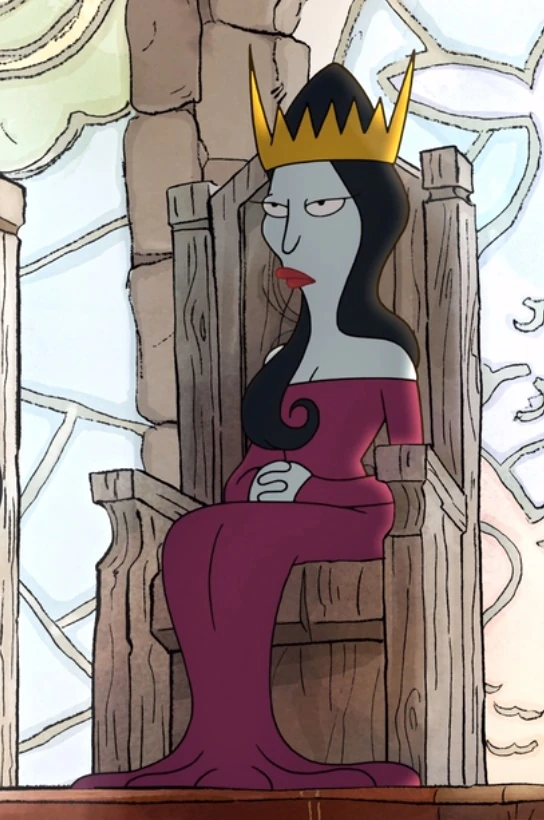 |
| Queen Oona from Disenchantment |
In a dramatic departure from blogging about the Simpsons, I'm blogging about Disenchantment, the latest Matt Groening cartoon series. This is Queen Oona, a fairly minor character (the wicked step-mother in this fairytale-inspired set of characters).
Queen Oona is from the neighbouring kingdom of Dankmire, and her accent is... European. Vaguely Russian, maybe? Kind of German? Anyway, whatever it's based on, the Dankmirian language clearly has what we call 'pro-drop', 'null subjects', or 'zero anaphora'. That means that in the right context, you can leave out a subject pronoun (this Spanish example is from Wikipedia):
Está completamente seco.In the example above, you can infer that the subject is he/she/it because the verb (está) has 3rd person singular agreement. From there, you have more or less as much information as if we'd just used the word it, and you use your normal contextual knowledge to fill in the referent, as with the English equivalent.
is completely dry
'It's completely dry.'
Oona said, in episode 6,
Is true.Shortly followed by
Or is?Both of these sentences would be totally grammatical in Oona's (let's assume Slavic) first language, where the word it can be left out. I don't know Russian so let's illustrate with Spanish again. This is the exact equivalent, and I think it's good:
Es verdad. O es?But the thing is, it made me laugh, and I think it was meant to. I don't know why. I came here thinking I had a good explanation: maybe because is is a clitic (a word that needs another word to lean on) in English, so this literal translation sounds just too unnatural? Maybe lack of familiarity with post-verbal null subjects, like in the question 'is (it)?' in this example? Another one to file under Things Someone Else Should (And Probably Has) Research(ed).
If I were translating what Oona said, in Spanish I would have to say: Es (la) verdad. ¿no es?, or in Colombian style "¿o no?" - this is what Oona uses in the European Spanish dub! I think this is because there is nothing to invert the verb with, as as such ¿o es? is the correct response when the initial phrase is negative (think pero vs sino). You can say ¿o sí?, (or yes?) which leads to the great expression sí o sí, as in, the listener has no choice in the matter. I think it works better in a Slavic language like Polish (which I can get by in) as "or" (in Polish "czy") is also an interrogative particle which begins the question. However, in this case it falls through as there is a different strategy: To prawda, czy nie? OR albo nie? (which OOna uses in Polish dub) depending on the type of OR clause Literally "This true, or not?". In Polish subtitles, czyżby (an invented word formed from "is it?" (a particle, nto a verb) + the conditional mood marker for verbs) Japanese is also pro-drop, but the language doesn't lend itself well in this context. These types of questions are made with a particle that doesn't tend to exist separated from the phrase it is qualifying. Sorry for this rambling response, but I love analysing fictional languages. Jake.
ReplyDeleteIn episode 6 when Oona says "Is true. Or is?", in polish she says: "Żartuję. Albo nie" (dubbing) or "To żart. Czyżby?" (subtitles). Yes, polish subtitles are different from dubbing.
ReplyDeleteIf we imagine, that Oona intuitively uses some grammar structures from some dankmirian language, which she spoke before she moved to Dreamland, this could actually work.
If we take "Żartuję. Albo nie" version, the wrong (but intuitive) translation word by word would be: "Joking. Or not", which is not similar. If we do the same to the: "To żart. Czyżby?" version, for the first part the result is: "Is joke", so we are getting closer. We encounter a problem for "Czyżby?" part. "Czyżby" is an exclamation, a compound word created by "czy-" (or), "-ż-" (no translation, but it's a particle) and "-by" (also a particle, also no translation). It cannot be translated.
On the second hand, polish subtitles are clearly translated from english and they don't sound quite natural. If someone would say what Oona means, they would probably say: "To żart. A może nie?", which could be (badly, but intuitively) translated as: "Is joke. Or [maybe] not?".
Furthermore, Oona says "w" as "v", and in Poland this is exactly how we pronounce "w" sound.
Oona sounds kind of like some polish people, who are trying to use english intuitively.
This similarity to the polish language has a funny side effect. Oona is not that funny in polish version, because what she says is almost correct :)